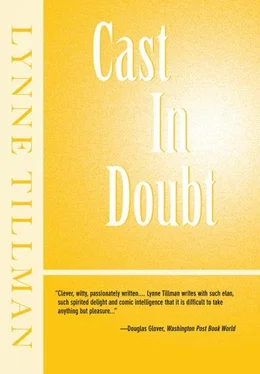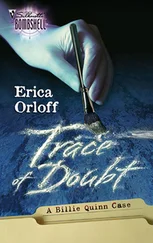Dear Alicia, who had not sung in public in many years, the dear woman performed, I like to think, as a gift for me. She moved to the center of the room and rapped her wineglass with a fork, to call us to attention. She announced she would sing an aria from La Bohéme . Everything and everyone halted. There was quiet, even from Wallace’s boisterous quarter.
In Alicia’s voice was such poetry, such beauty, that ancient spirits and memories overtook me, and constraint fled. The music of the gods! I closed my eyes. I dwelled on the heartbreak of Mimi’s death, on the despair brought by sickness, on succumbing to tragedy, on loss, on love. I felt an unimaginable sadness for the world, for everyone who had ever been abandoned and who had been lost, for everyone who had loved and who had lost, and that gathered us all in, all. I opened my eyes and with them swept the room slowly, and I saw before me people I’d known for years. And even Wallace, who can be so annoying, even he and his pain, his foolish and profound anguish, touched me.
There were tears in my eyes. There were tears in Gwen’s eyes. I had never before seen Gwen cry. For what or for whom did she cry? The sick musician who ate peanut-butter sandwiches at 4 A.M. and left her alone in her apartment? For her unwritten torments? For the problems of her race? Were we crying for the same things? Surely her flippant wish — to cry at her party — had come true, but how sorry I was. Still, sometimes it is healthy to cry. I believe that to be true. I had lost Yannis, I had lost Helen, and many more, and Alicia had lost John and others, and some had lost us. Gwen — ah Gwen — Gwen always expected to lose.
Alicia finished singing. We were ravished, rapt, silent. Then we applauded and cheered. Wallace threw kisses and he and his crowd clamored, Brava, brava! Gwen rushed to Alicia and kissed her hands. I will never forget that sight. It was so very unexpected. But in so many ways Gwen is and was unpredictable. In response, Alicia held Gwen’s face in her hands and looked deeply into Gwen’s eyes. From that moment on they were true friends. It happened like that. It does sometimes happen like that. And so what seemed to have been terribly sad at the time metamorphosed into something rather happy.
Two days later Gwen flew home. My life returned to normal, dominated by my usual routine. I finished my crime book — Stan Green does indeed crack the code in the young murderer’s diary and simultaneously cracks the case. It was the easiest way to handle it; and it worked, I thought. I was conscious that I had not cracked Helen’s diary, but then it was not in code. I held that it was poetic justice and artistic license that my protagonist would do so in my book. My publisher was satisfied, in any case, and that was what mattered.
Roman did not come to stay or even to visit me. I kept expecting him and then one day I no longer expected him. Who knows what happened to him after I left the encampment? Perhaps the old woman warned him against trailing after a gadjo like me. Yannis lived with Roger for a time. Their fights were monumental; sometimes both stayed home and out of sight because of the shiners they’d given each other. Yannis drifted away from him as well. Roger continued to work on his second novel, which still has not appeared. Wallace had another nervous breakdown. Stephen the Hermit returned but said not a word to me about our morning on the beach. I worried he would and fantasized that he’d accuse me of the theft. But he never did. John left the Greek widow Ariadne two years ago and disappeared; she abandoned Crete for Athens, seeking a better life, one not sullied by rumor and insinuation.
Alicia is still in her lovely home, surrounded by beauty, as nimble and unflappable as ever. She maintains it is the yoga. I continue to refuse to do it, though. Recently she met a Danish woman, a retired biologist, and they are now living together. I am happy for Alicia. As usual, Roger has nothing good to say on the subject.
Over the years, and with greater and greater infrequency, I remembered Helen. Once, carefully tracing the trajectory of my feelings, I discovered that my initial reaction to her diary was similar to my reaction to an attenuated affair of the heart in my sophomore year in college. I had had a crush on an upperclassman named Allan, who was to me rapture itself — he was the perfect man. In my eyes he was everything I wasn’t. I joined his club, I signed up for his classes and then finally I conquered my fears and spoke to him, my hero. Boldly I proposed a date with him, for lunch at a lovely French restaurant, which he accepted. I dressed with such care and eagerness one would have thought I had an audience with the Pope. But the truth was, he was insipid — beautiful, but insipid. He had nothing to offer except his good looks, which taught me rather early that sometimes beauty is wasted on the beautiful. Yet I have never deserted the pursuit of, and fascination with, beauty.
I decided that Helen too was insipid and uninspired. That I had drawn inspiration from her became a disturbance to me, not unlike the occasional static on my shortwave radio. On Sundays it is my habit to listen to the BBC World Service.
Not long ago, a letter arrived from Gwen. I awoke to see it sticking out from under the door, its airmail envelope beckoning to me. Nectaria had brought it upstairs and pushed it beneath my door, which she does from time to time when she thinks something’s important. By now, she recognized Gwen’s handwriting; and too, Nectaria liked Gwen. Gwen made her laugh. I hoped for one of Gwen’s long, newsy, gossipy epistles.
25 November 1980
Dear Lulu,
Owing to a series of disasters, details of which I will not bore you with at this time, I have had to change my address and telephone number.
She then provided both. Next to the telephone number was the word UNLISTED.
I beseech you not to give these out to anybody — anybody at all — no matter how innocent — sounding the request (and this goes for the likes of…)
Here she enumerated the names of people we both knew and to whom I thought her very close and attached.
Everybody, in fact. I will tell you more when next we speak or see each other.
Love to you,
G
The letter, its brevity, its absoluteness, the disasters she alluded to — all were greatly troubling. The letter was paranoid enough that I became thoroughly and irrevocably alarmed. I had been, for many years, expecting that Gwen would meet with doom — an accident or fatal trouble. Immediately I telephoned my travel agent, closed up my apartment, and gave instructions to Nectaria. The next day I was on a plane to Athens. From there I flew to New York City, where I stayed for two months.
Gwen was not at all surprised to see me and acted as if it was quite in keeping with me to show up unannounced on her doorstep, so to speak. This was of a piece with Gwen, not to be surprised. We caught up. We covered our lives and gossiped about everything that had happened since we had last seen each other, five years ago. For it had been that long — or short. I hadn’t had Chinese food in many years and she invited me to dine at her favorite restaurant. This is where Gwen sagaciously announced, Sometimes history chooses for us and we are at its mercy.
In the course of that evening I explained to Gwen that I had reached the point in my life — I am nearly seventy — when I ask myself, How could I have done things differently? Could I have? I am not without regret though I am not filled with remorse either. It would be impossible to imagine a life that did not contain some regrets. My concern was: Was there a task with which I had been entrusted that I had not fulfilled? I felt relieved that Gwen was present to listen to me and to hear my plaints.
Читать дальше












